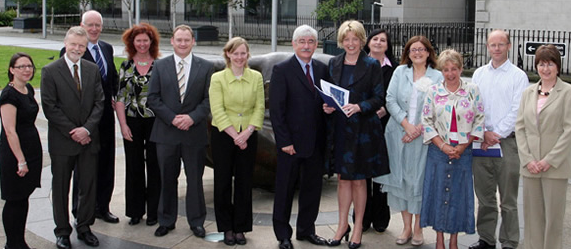
Minister for Eduction and Skills, Mary Coughlan T.D. with the Project Maths Implementation Support Group (including Lewis Purser, IUA Director of Academic Affairs - 2nd from right)
Mary Coughlan TD, Tánaiste and Minister for Education and Skills, today welcomed the report of the Project Maths Implementation Support Group – an industry/education partnership set up to examine how best stakeholders from business, second level and higher education can work together to achieve the objectives of Project Maths. Project Maths is a programme of reform in second level schools designed to teach mathematics in a way that promotes enhanced skills and real understanding, where students can appreciate the relevance of what they are learning and its application to everyday life, and how mathematics can be used to solve problems.
Project Maths is already being implemented in 24 project schools and will begin in all second level schools in September. Some €5m is being invested in professional development of teachers this year to support the initiative, and this will continue on a rolling basis to at least 2013. This is the biggest investment in curriculum reform in a subject ever made by the State. The initiative has been widely welcomed in the business sector and by bodies such as Forfás, the Expert Group on Future Skills Needs, and the Innovation Task Force.
The Project Maths Implementation Support Group was chaired by Mr Frank Turpin, former Education Manager in INTEL Ireland, and nominee of the Irish Business and Employer’s Confederation on the National Council for Curriculum and Assessment.
The key recommendations in the report are set out below.
- The rollout of Project Maths to all schools from September 2010 should proceed with optimum speed as planned, supported by comprehensive planning and the necessary resources.
- All schools should be required to provide a minimum of one mathematics class every school day for all students.
- The message of Project Maths should be promoted clearly to all stakeholders through various media. Awards for excellence in mathematics, industry volunteers to support teachers/students, a mentoring scheme for high achievers, a Maths Champions Programme, the development of resources and other supports to provide authentic real life mathematics examples in support of the curriculum, and comprehensive careers information on mathematics are also recommended.
- The Department of Education and Science should work towards the achievement by 2018 of an objective that all students should be taught mathematics solely by teachers who hold a mathematics qualification, and post graduate courses should be provided on a scale and level commensurate with this objective, enabling the estimated 2000 teachers who do not hold such a qualification to upgrade their skills.
The group reached no consensus on bonus points. However it recommended that if bonus points are to be introduced they should be designed to compensate for the perceived additional workload associated with higher level mathematics and particularly incentivise the 20% of pupils who currently drop down from higher to ordinary level late in senior cycle, who might be likely to score a Grade C at higher level. The possibility of making mathematics a mandatory subject for CAO purposes should also be explored in discussion with higher education institutions.
The report also recommends that higher education institutions should offer a second chance examination in the autumn targeted at the small number of students who have taken higher level Mathematics but have failed to reach minimum matriculation requirements. This safety net would encourage more students to sit Leaving Certificate Mathematics at higher level.
Speaking at the presentation of the Report, the Chairperson of the Group, Mr Frank Turpin, formerly of INTEL said:-
“Project Maths is one of the most important and exciting curriculum interventions ever in Post Primary Education in Ireland. I would like to thank Minister Coughlan and her predecessor Minister O’Keeffe for their unstinting support of this essential change in a time of resource constraint. I would also commend my colleagueson the Implementation Support Group whose enthusiasm and commitment further underlines the importance all stakeholders place in Project Maths. The successful implementation of Project Maths is nothing less than key to Ireland’s goal of success as a Smart Economy.”
Welcoming the report, the Tánaiste said:
“A high level of mathematical achievement is vital for Ireland’s future competitiveness. Maths is an essential skill for disciplines such as science, technology, engineering and finance, but it is also an essential skill for life. The ability to think rationally, analyse and solve problems, and process data clearly and accurately is assuming increasing importance as Ireland moves up the value chain in employment in the knowledge society. I am very pleased to see this partnership between the second level and higher education sectors and industry promoting and adding value to Project Maths.”
Ends
For more information contact :
Lewis Purser, IUA Director of Academic Affairs
Telephone: (+353 1) 6764948